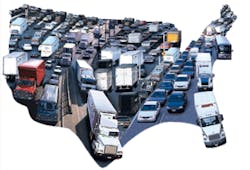Traffic congestion in 2003 cost Americans 3.7 billion hours in delays and 2.3 billion gallons of wasted fuel, according to a report released by the Texas Transportation Institute (TTI) today. Compared with 2002, this marks a 2.8% increase in delays and a 4.5% jump in wasted fuel.
“The problem can be stated simply—urban areas are not adding enough capacity, improving operations or managing demand well enough to keep congestion from growing larger,” stated TTI.
Among the urban areas reviewed, Los Angeles was recognized as having the worst congestion, with travel times in peak hours averaging about 1.75 times longer than free flow conditions. Chicago ranked second, with San Francisco-Oakland following close behind as their travel time indexes were 1.57 and 1.54, respectively.
Of the 85 urban areas studied, 53 have seen traffic growth outstrip capacity improvements by more than 30%. Only four urban areas were noted to have added road capacity within 10% of the rate of traffic growth.
Compared with 1982, when TTI began conducting its annual Urban Mobility Report, time spent in traffic delays had jumped over five-fold in 2003.
TTI noted that the U.S. House has passed its version of a six-year highway bill that includes a congestion relief program. The initiatives outlined by the bill include building more road and transportation capacity, operating that capacity efficiently, and pricing and truck-only lane projects, TTI said.
“Congestion is a complicated issue and can’t be solved with one approach nationwide,” said Tim Lomax, a research engineer at TTI. “We need to think about how policies and programs enacted at the federal, state and local levels affect congestion.”
The Road Information Program (TRIP), a nonprofit group that promotes transportation policies that eases congestion, said the TTI study underscores the need for national road improvements for the economy.
“Just-in-time delivery on our nation’s highways is critical to our fast-paced economy and our competitive advantage in the global marketplace, yet congestion is eroding the ability to efficiently move goods and products by truck,” William M. Wilkins, TRIP executive director told Fleet Owner. “We cannot afford to be stuck in traffic when it comes to addressing America’s vital travel demands.”
To view the full report, visit mobility.tamu.edu/ums/report/.
